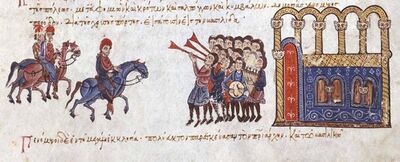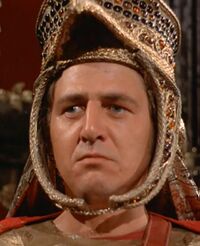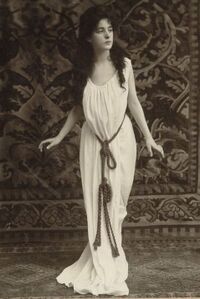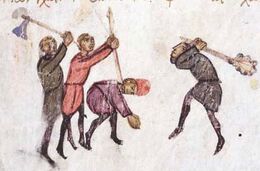Nikephoros II
“I may be brutal and ugly but I keep my word”
Emperor Nikephoros II was a man who was said to be 'very ugly', a heavy drinker, obnoxiously loud and one of the most successful Byzantine rulers when it came to a battlefield. Better a brutal leader rather than a pious penitent?
Origins[edit]
Nikephoros Phokas (to give him his full name) belonged to a dynasty of generals. They didn't do 'subtle', preferring to smash enemies rather than negotiate. Nikephoros's own record was distinctly mixed. With his brother Leo Phokas they recaptured Crete for emperor Romanos II from the Arabs in 961. A year later Nikephoris were on the Syrian border and took Aleppo with the help of his colleague John Tzimiskes ('Johhny Dance Yourself Tzizzi'). Nikephoros was essentially raining on Romanos II's parade with the latter preferring to hunt wild rabbits than go to war himself. It was a tricky position to be in. Generals who were victorious in battle had a habit of rebelling in the Byzantine Empire or getting a serious physical downgrade (sans eyes, sans life). Before Romanos could consider replacing Nikephoros the former died suddenly in March 963 after drinking a dubious concoction prepared by his wife Theophano. Romanos's sons Basil II and Constantine VIII were both under the age of five and despite their imperial crowns, vulnerable to a rapid overthrow. They would need a protector. Would a eunuch do for now?
A wealthy widow[edit]
The widowed Empress Theophano was obliged to share power with Romanos's chief de-testicled minister Joseph Bringas. She was declared regent and went after any possible threats. These included the long ago deposed emperor Stephanos who had been living on an off-shore island reserved for 'suspicious types'. Stephanos was found dead in his monastic cell with a head wound barely a month after the death of Romanos. Officially Stephanos was said to have 'slipped on the floor' and had fatally cracked his own noggin. No one felt free to argue with that. Theophano's 'death emperor' tally had gone up to three. She hadn't finished.
This was all well and good but an empire ruled (in name at least) for two young boys by a murderous mother and a eunuch didn't look very secure. Theophano needed a 'protector'. She concluded Nikephoros would be suitable but he wasn't in Constantinople but on the eastern frontier. A letter was sent with a suitably flattering icon of Theophano to encourage Nikephoros to come to her aid against Bringas. The latter hoped to supply his own 'emperor' to marry Theophano but could find no takers. In August 963 Nikephoros was outside the capital with an army when an internal rebellion led by Basil Lekapenos (son of Romanos I and half brother of the recently topped Stephanos prevailed and opened the gates to Nikephoros[1]. Sweeping aside the corpses that littered the city Nikephoros and Theophano were married. Bringas was exiled and died not long after, perhaps another victim of Theophano.
Reign and Embassies[edit]

Nikephoros's skills were cleaving skulls, not the suitable arts of being diplomatic. An attempt to recapture Sicily saw the loss of all the remaining Byzantine holdings on the island. Relations with the Bulgarians also took a turn for the worse but didn't break into open war.
This wasn't so with the Holy Roman Empire. The Byzantines were keen to hold to what they had left in Southern Italy whilst the Holy Roman emperor Otto wanted to spread his domain south. This led to something of a proxy war between the two sides - using local allies rather going in for a head on clash. Compounding this was also the long running (and never solved) argument about which empire was the true successor of the original Roman Empire. The Byzantines hadn't been happy ever since Charlemagne had claimed the title back in 800 nor Otto's revival of the title in 962 improved matters. The Germans suggested a marriage between the two realms, Otto's son Otto junior with Anna, daughter of Theophano. The alternative would have been the sisters of Romanos II who had been dumped into a nunnery earlier but Theophano wasn't going to have that. Otto's ambassador Luitprand called Nikephoros 'Emperor of the Greeks' which went down like a bowl of cold sick[2]. The Byzantines may have had Greek titles and spoke the language but they called themselves 'Romans'[3]. The Westerners remained in Byzantine eyes barely improved barbarians who got their fancy titles via a corrupt papacy in Rome.
Victories in the East[edit]
The Byzantine empire's lack of victories in the west contrasted with their continuing success further east. Nikephoros lead his armies to success there. Territories that had been lost like the city of Antioch and Cyprus to the muslim empires in the 7th and 8th century were recaptured. The border had been effectively moved many miles in favour of Nikephoros.
Nikephoros was so happy with victories that he wrote manuals explaining battle tactices. They are a bit dry but considering how the Europeans fought their wars at the time ('turn up, bash heads and claim victory'). To smug Byzantines it was another example of their superiority.
Murder[edit]
Empress Theophano's marriage to Nikephoros produced no children which suggests the couple never 'got it on' during their marriage. Nikephoros was no romantic, he loved war and everything associated with it. Nikephoros hated luxury and soft furnishings, blaming them for making previous emperors so weak in the past. He preferred living in a military tent.
For whatever reason Theophano quickly got bored with her marriage. Her charms switched to the recently widowed John Tzimiskes (later emperor John I). He was a nephew of Nikephoros and had received military promotion and other goodies. John and Theophano started a relationship in secret, made easier by the emperor's constant absence from Constantinople for wars in the east. Soon a conspiracy was formed. With the help of other generals who had fallen out with Nikephoros, Theophano arranged to let the conspirators murder her boorish husband. In December 969 she slipped out of their imperial bed and left the door unlocked. John Tzimiskes and his band of killers entered the room. The unarmed Nikephoros (wearing just his socks) was killed after a fierce struggle and his body thrown out of a window. Ahh..the joys of being an emperor.
With her husband dead and her eldest son Basil still yet to start shaving, Theophano expected to carry on in real power. All the couple had to do was to join bloodied hands and marry each other. But Theophano was in for a surprise!
References[edit]
- ↑ Basil never let family feelings get in the way of an advancement if necessary
- ↑ Luitprand and his embassy were moved from a swanky palace to a drafty monastery in response and then told to leave the city.
- ↑ Greeks still don't call themselves "Greeks" They refer to themselves as "Elines" So be careful to avoid a fist fight
| Preceded by: Romanos II |
Byzantine Emperor 963–969 |
Succeeded by: John I |



